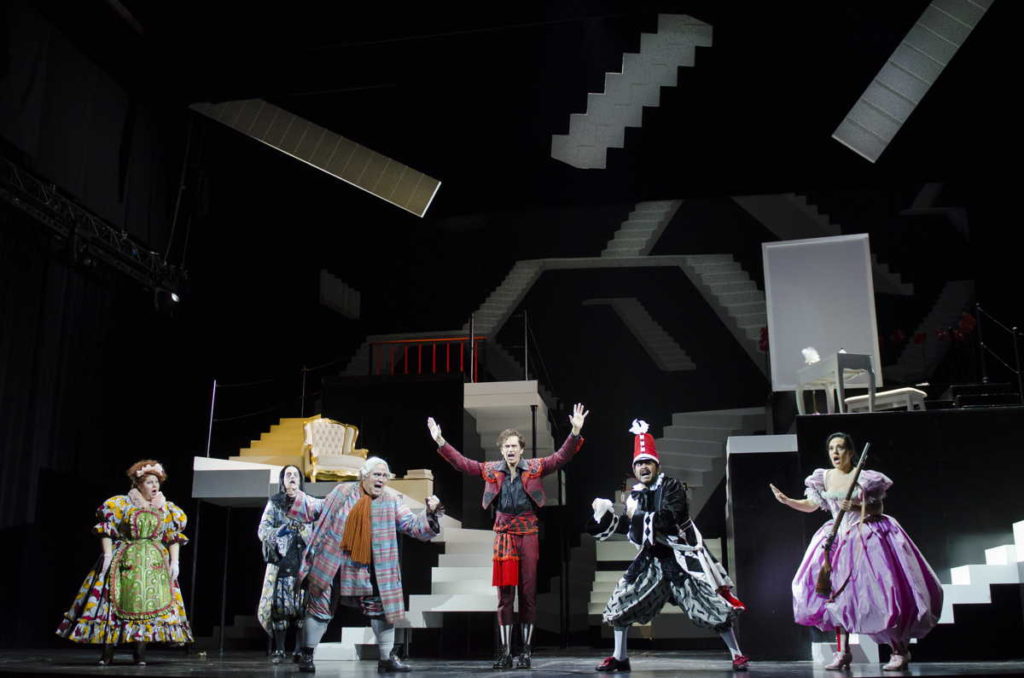
The cast; photo by Liza Voll Photography.
Presented by Boston Lyric Opera
Score by Gioachino Rossini
Libretto by Cesare Sterbini
Conductor David Angus
Stage Director Rosetta Cucchi
October 12 – 21, 2018
Emerson Cutler Majestic Theater
219 Tremont Street
Boston, MA 02116
BLO on Facebook
Review by Diana Lu
(Boston, MA) The Barber of Seville, or The Useless Precaution, remains one of the most well-known pieces of classical music in the modern world, and for good reason. The score sparkles and gambols, flickering from one indelible motif to the next. The libretto tells the universally appealing story of youth counterculture fighting for love and sticking it to the man.
A Prequel to Mozart’s The Marriage of Figaro (yes, that Figaro), Barber’s story is the first of a trilogy of plays by Pierre de Beaumarchaise about the eponymous barber. Classes clash as Figaro’s penchant for subverting the power structure is employed to help sweethearts Count Almaviva and Rosina come together. To this end, he hatches an elaborate scheme for Rosina to escape the clutches of decrepit doctor Bartolo and his corrupt accomplice Don Basilio. Their plan is for Bartolo to marry Rosina and requisition her dowry. Hilarity ensues and confusion heightens up to the very last scene, when order is restored and everyone gets a happy ending.
This staging by the Boston Lyric Opera does the masterpiece justice and added artistic whimsy that enlivened the canon staple for contemporary audiences. The production was a sight to behold. The set was designed to resemble M.C. Escher’s iconic lithograph print, Relativity, with stairs running in surreal diagonals all across the stage. Players were costumed in lavish outfits and makeup that evoked Alice in Wonderland or Charlie and the Chocolate Factory. Like a Tim Burton movie, the normal laws of physics and social order were upended, creating a vivid dreamscape that juxtaposed romcom with horror, social commentary with silly goofs, the classical with the modern with the timeless.
There were many moments of laugh-out-loud hilarity, as well as contemporary references that, like trills, peppered the show with extra absurdity and comic flair. At one point, Bartolo puts on Beats by Dre wireless headphones, leading to the scheming lovers’ breaking into a riff of Bad Romance by Lady Gaga. The physical humor of that scene also rivaled that of The Three Stooges.
The ladies stole the show. Daniela Mack (Rosina)’s mezzo-soprano was lush and technically robust. Michelle Trainor (Berta)’s comedic timing was as precise and potent as her extraordinary voice. Steven Condy (Bartolo) rattled off an impeccably articulate basso buffo, while David Crawford (Basilio) and Jesus Garcia (Almaviva)’s smooth tones underscored nimble physicality. In comparison to these stellar performers, Matthew Worth’s Figaro was relatively weak. His acting was less effervescently playful than I’d expected and his singing a bit strained, as if he isn’t yet confident in his mastery of the role.
Though there were only two female characters, the libretto showed the inner life of both. That’s impressively feminist even by today’s standards. In particular, Berta could have stayed a voiceless comedic stooge, but instead, she gets her own aria, expressing her desires, struggles, and pain. She represents the darker half of the female dichotomy in this world—what are the fortunes of the women who aren’t bewitchingly beautiful, who don’t get saved, who are abandoned, even by love? In fact, each character, though clearly archetypes, was rendered as satisfyingly human, making their interactions fun to watch and the story universally relatable.
Bartolo and Basilio represent power, corruption, and the suffocating social order, but are they not locked into impossible roles in a stifling patriarchy as much as Rosina and Berta? Figaro, Almaviva, Rosina, play underdogs working against the system and love ultimately triumphs, but then we remember that Almaviva is a count, who won by paying his way out of every obstacle he ran into. One wonders why Figaro, with his rebellious nature, would aid and abet the aristocracy at all. Indeed, Beaumarchais himself eventually became a significant player in support of the American and French Revolutions. That subversive factoid left an unsettling undertone as I left the theater and returned to our maddening present world.
All in all, BLO’s Barber of Seville was a wonderful production. My only niggling complaint was that the audience was so homogenous and utterly bereft of young people. European opera houses provide standing room or last-minute seats to students, tourists, and anyone else for whom ticket prices are prohibitively expensive. What it would mean to have a system like that here so that every generation and class of people can experience these timeless masterpieces, and recognize their own humanity within them?
